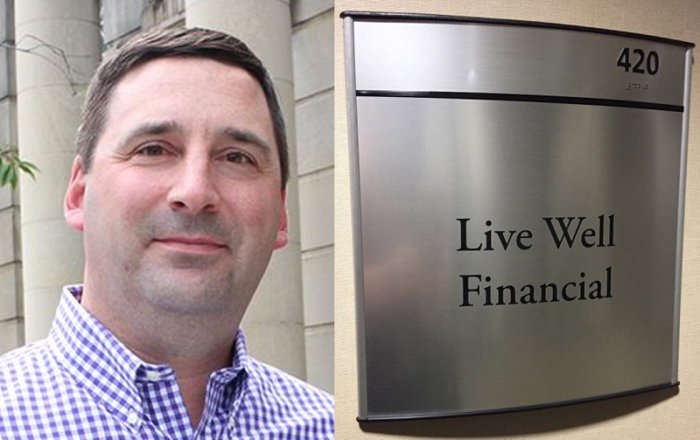Michael Hild’s bid to stay out of prison was dealt a major blow on Wednesday, as a federal judge denied the embattled Richmond businessman’s request for an acquittal or new trial and upheld his criminal conviction.
Judge Ronnie Abrams, of the U.S. District Court for the Southern District of New York, made the ruling in a 64-page opinion that came 18 months after a jury found Hild guilty of a fraud that toppled his Chesterfield-based mortgage company Live Well Financial.
Abrams found that Hild’s argument of ineffective counsel and insufficient evidence from the prosecution did not warrant an overturning of the verdict or a retrial.
Hild now is set for sentencing, which will take place Jan. 27 at 4 p.m. in federal court in Manhattan. He faces a combined maximum of 115 years in prison on counts including securities fraud, mail fraud and bank fraud, though his sentence will surely be lower. He also faces a maximum fine of $5 million.
An email seeking comment sent to Hild’s post-trial attorney, Brian Jacobs of New York law firm Morvillo Abramowitz, was not returned Wednesday afternoon.
While remaining free since the jury verdict in April 2021, Hild has argued that his former attorney and childhood friend Benjamin Dusing, who represented Hild in the two-week trial, had conflicts of interest that violated his client’s Sixth Amendment rights.
Dusing, who has since fallen into additional legal trouble, was in fact embroiled in multiple custody battles in his home state of Kentucky while simultaneously working the Hild case in New York. Hild and his attorney seized on that fact and Dusing’s other legal issues in trying to convince the judge that Dusing wasn’t doing his job in a way that was constitutional.
But Abrams ultimately wasn’t convinced.
“Such circumstances may well have taken a psychological toll, and could understandably have left Dusing deeply concerned about events in Kentucky while at trial in New York. But in another sense, balancing multiple obligations and personal and professional priorities is the norm of the profession,” Abrams said.
Abrams recognized Dusing’s at-times bizarre post-trial behavior in Kentucky, but went as far as to defend his performance during the Hild trial.
“To the contrary, over the course of the two-and-a-half week trial, the court observed Dusing’s representation first-hand and found him to be a zealous and articulate advocate – at the very least on par with other white-collar litigators who regularly practice in this district,” she said.
Abrams said the Dusing’s custody cases were not an inherent conflict but rather a “scheduling burden.”
“In essence, Hild alleges that Dusing was simply more attentive to and invested in the outcome of his personal litigation than the outcome of the ongoing criminal trial. Such a circumstance does not form an actual conflict,” Abrams opined.
While ruling against Hild and labeling Dusing’s post-trial legal issues in Kentucky as “unusual and troubling circumstances,” Abrams made clear that Hild’s arguments of ineffective counsel did give her an interesting legal argument to ponder.
“Hild raises a novel legal argument, however, which presents a challenging question at the intersection of the Sixth Amendment right to conflict-free counsel and the modern reality – all too familiar to those who work in the legal profession – that other obligations, personal and professional, inevitably arise, even when ensuring a fair trial for the accused.”
“Namely, can a scheduling ‘conflict,’ in the colloquial sense, together with the preoccupation and workload that accompany it, rise to the level of an ‘actual conflict…’” she added.
Abrams noted that there is scarce relevant caselaw in addressing attorney scheduling conflicts and that one must tread carefully in making what could be a major precedent-setting ruling.
“A finding here that Dusing’s competing personal and professional obligations constituted an “actual conflict” could open the floodgates to challenges of purported “actual conflicts of interest” in nearly every criminal case, as every attorney has other obligations – personal and professional – that may affect their performance,” she said.
“It would dramatically alter the existing legal framework to conclude that an actual conflict may arise every time a lawyer has a family vacation, obligations to care for an ailing loved one, or a child to pick up from daycare.”
Hild also challenged the sufficiency of the evidence put on by the prosecution, arguing that the government failed to prove that he misrepresented the value of the reverse mortgage bonds that were the crux of the case. He also argued that the U.S. Attorney’s Office failed to prove his fraudulent intent and that the jury wasn’t presented a full case at trial.
Again, Abrams wasn’t moved.
“The Court thus determines that there is no danger that the jury convicted Hild for a crime other than what is alleged in the indictment,” she wrote.
The Manhattan jury deliberated for just a few hours after the two-week trial, finding Hild guilty on all counts, including securities fraud, mail fraud and bank fraud.
The government indicted and arrested Hild for helping mastermind a scheme to defraud Live Well’s lenders by falsely inflating the value of a portfolio of reverse mortgage bonds, in order to induce lenders into loaning more money to Live Well than they otherwise would have.
Hild’s defense at trial was built largely on arguing that the prices presented were based on the best estimate of their market value, despite them being difficult to value.
While Hild pleaded not guilty, two of his former Live Well lieutenants — CFO Eric Rohr and head trader Darren Stumberger — have pleaded guilty to similar charges and await their fate. Their sentencing dates have been repeatedly pushed back due to their involvement in the Hild case as cooperating witnesses for the prosecution.
Meanwhile, Live Well Financial’s resulting bankruptcy case lives on in Delaware bankruptcy court, where the trustee is battling Hild, his wife, Laura, and their various business entities over assets that could potentially be used to pay the company’s creditors.
The bankruptcy proceedings have been slowed by the lingering criminal case, but it’s unclear how Abrams’ ruling might immediately affect the Live Well proceedings.
Michael Hild’s bid to stay out of prison was dealt a major blow on Wednesday, as a federal judge denied the embattled Richmond businessman’s request for an acquittal or new trial and upheld his criminal conviction.
Judge Ronnie Abrams, of the U.S. District Court for the Southern District of New York, made the ruling in a 64-page opinion that came 18 months after a jury found Hild guilty of a fraud that toppled his Chesterfield-based mortgage company Live Well Financial.
Abrams found that Hild’s argument of ineffective counsel and insufficient evidence from the prosecution did not warrant an overturning of the verdict or a retrial.
Hild now is set for sentencing, which will take place Jan. 27 at 4 p.m. in federal court in Manhattan. He faces a combined maximum of 115 years in prison on counts including securities fraud, mail fraud and bank fraud, though his sentence will surely be lower. He also faces a maximum fine of $5 million.
An email seeking comment sent to Hild’s post-trial attorney, Brian Jacobs of New York law firm Morvillo Abramowitz, was not returned Wednesday afternoon.
While remaining free since the jury verdict in April 2021, Hild has argued that his former attorney and childhood friend Benjamin Dusing, who represented Hild in the two-week trial, had conflicts of interest that violated his client’s Sixth Amendment rights.
Dusing, who has since fallen into additional legal trouble, was in fact embroiled in multiple custody battles in his home state of Kentucky while simultaneously working the Hild case in New York. Hild and his attorney seized on that fact and Dusing’s other legal issues in trying to convince the judge that Dusing wasn’t doing his job in a way that was constitutional.
But Abrams ultimately wasn’t convinced.
“Such circumstances may well have taken a psychological toll, and could understandably have left Dusing deeply concerned about events in Kentucky while at trial in New York. But in another sense, balancing multiple obligations and personal and professional priorities is the norm of the profession,” Abrams said.
Abrams recognized Dusing’s at-times bizarre post-trial behavior in Kentucky, but went as far as to defend his performance during the Hild trial.
“To the contrary, over the course of the two-and-a-half week trial, the court observed Dusing’s representation first-hand and found him to be a zealous and articulate advocate – at the very least on par with other white-collar litigators who regularly practice in this district,” she said.
Abrams said the Dusing’s custody cases were not an inherent conflict but rather a “scheduling burden.”
“In essence, Hild alleges that Dusing was simply more attentive to and invested in the outcome of his personal litigation than the outcome of the ongoing criminal trial. Such a circumstance does not form an actual conflict,” Abrams opined.
While ruling against Hild and labeling Dusing’s post-trial legal issues in Kentucky as “unusual and troubling circumstances,” Abrams made clear that Hild’s arguments of ineffective counsel did give her an interesting legal argument to ponder.
“Hild raises a novel legal argument, however, which presents a challenging question at the intersection of the Sixth Amendment right to conflict-free counsel and the modern reality – all too familiar to those who work in the legal profession – that other obligations, personal and professional, inevitably arise, even when ensuring a fair trial for the accused.”
“Namely, can a scheduling ‘conflict,’ in the colloquial sense, together with the preoccupation and workload that accompany it, rise to the level of an ‘actual conflict…’” she added.
Abrams noted that there is scarce relevant caselaw in addressing attorney scheduling conflicts and that one must tread carefully in making what could be a major precedent-setting ruling.
“A finding here that Dusing’s competing personal and professional obligations constituted an “actual conflict” could open the floodgates to challenges of purported “actual conflicts of interest” in nearly every criminal case, as every attorney has other obligations – personal and professional – that may affect their performance,” she said.
“It would dramatically alter the existing legal framework to conclude that an actual conflict may arise every time a lawyer has a family vacation, obligations to care for an ailing loved one, or a child to pick up from daycare.”
Hild also challenged the sufficiency of the evidence put on by the prosecution, arguing that the government failed to prove that he misrepresented the value of the reverse mortgage bonds that were the crux of the case. He also argued that the U.S. Attorney’s Office failed to prove his fraudulent intent and that the jury wasn’t presented a full case at trial.
Again, Abrams wasn’t moved.
“The Court thus determines that there is no danger that the jury convicted Hild for a crime other than what is alleged in the indictment,” she wrote.
The Manhattan jury deliberated for just a few hours after the two-week trial, finding Hild guilty on all counts, including securities fraud, mail fraud and bank fraud.
The government indicted and arrested Hild for helping mastermind a scheme to defraud Live Well’s lenders by falsely inflating the value of a portfolio of reverse mortgage bonds, in order to induce lenders into loaning more money to Live Well than they otherwise would have.
Hild’s defense at trial was built largely on arguing that the prices presented were based on the best estimate of their market value, despite them being difficult to value.
While Hild pleaded not guilty, two of his former Live Well lieutenants — CFO Eric Rohr and head trader Darren Stumberger — have pleaded guilty to similar charges and await their fate. Their sentencing dates have been repeatedly pushed back due to their involvement in the Hild case as cooperating witnesses for the prosecution.
Meanwhile, Live Well Financial’s resulting bankruptcy case lives on in Delaware bankruptcy court, where the trustee is battling Hild, his wife, Laura, and their various business entities over assets that could potentially be used to pay the company’s creditors.
The bankruptcy proceedings have been slowed by the lingering criminal case, but it’s unclear how Abrams’ ruling might immediately affect the Live Well proceedings.



I rented from this guy, and he’s the most petty vengeful person I ever met. My guess is he talks up his innocence right up until the moment when goes postal on some folk and proves he was guilty all along. No way after all this he just takes the 3-4 years in jail (which would’ve been nearly over by now – idiot!)
Certainly, as the Judge says, an interesting case — but Hild seemed to not have a strong case to begin with — and that is the first thing to consider when judging the Defense — the defense had a rather creative approach, and the appeal is also a rather creative approach — much like the accused’s accounting is alleged to be also rather creative… I don’t know all the details so I am not saying I know he is guilty, it just seemed like his case was weak from the get-go and his childhood friend was not in the best… Read more »
Just another white collar criminal who uses money, time and legal wrangling to try to save his hide.